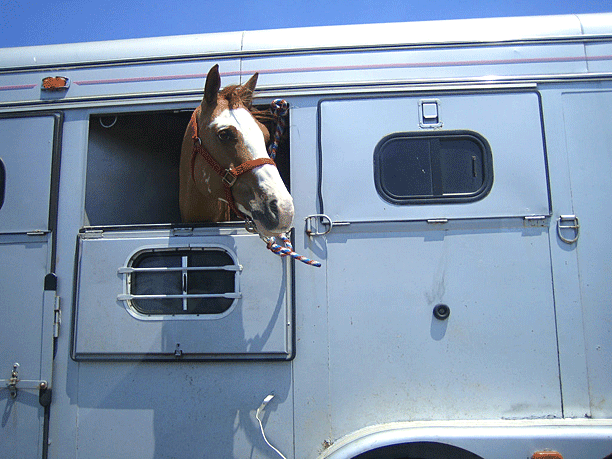| Safety tips for before, during and after your trip |
The spring weather seems to beckon everyone toward travel and as a horse owner, the obvious choice is to travel somewhere with your horses in tow. But whether you are traveling with your horses for recreational or competition purposes, preparing for the trip from beginning to end helps prevent illness in your horse and unnecessary stress on you. [emember_protected custom_msg=”Click here and register now to read the rest of the article!”]
Saundra TenBroeck, Ph.D., assistant professor and Extension Horse Specialist at the University of Florida, provides helpful tips on what to do before, during, and after your trip so you and your horse can enjoy the time away from home.
BEFORE
The most important step to take, according to Dr. TenBroeck, is to plan ahead, especially with knowing what will be provided for your horse at your destination and driving directions. Dr. TenBroeck also suggests learning what virus outbreaks might be in the area you are going to and to have your horses’ basic vaccinations done two weeks prior to the trip.
“You have to think about what disease challenges there will be and plan for that strategically with your preventive medicine, which you can create as part of a pre-travel plan with your veterinarian,” she states.
When preparing your vehicle and trailer for the trip, it is recommended to choose a vehicle that can appropriately handle your animal cargo and that you can drive with ease.
DURING
Horses easily get stressed during travel, so Dr. TenBroeck recommends loading your horse in a slanted position or have them ride backward in the trailer as it reduces stress. Since horses are social, another horse in the same trailer can keep them occupied and calm.
If your horse hasn’t traveled before, Dr. TenBroeck says taking it on short “practice” trips can prepare it for travel. It is recommended to give your horse breaks during the drive for food and water, letting them out of the trailer only if the area is safe and away from the highway.
What is necessary, though, is giving your horse time to put their head down to allow nose mucus to drain that could encourage respiratory infections. “Horses are designed to put their head down to graze about 60 to 80 percent of day. It bothers horses to have their head up for a long time, so allowing them to drop their head down every few hours is probably better than taking the horse off the trailer,” she clarifies.
AFTER
Upon returning home, Dr. TenBroeck suggests keeping the horse that traveled separate from your other horses in case they have any disease or respiratory infections. Two weeks of quarantine will show if the horse has an illness.
Consider taking these safety precautions to make your trip a treasured memory for you and your horse, not a disastrous experience.
CREDITS
story by BLAIR TOWNLEY [/emember_protected]

